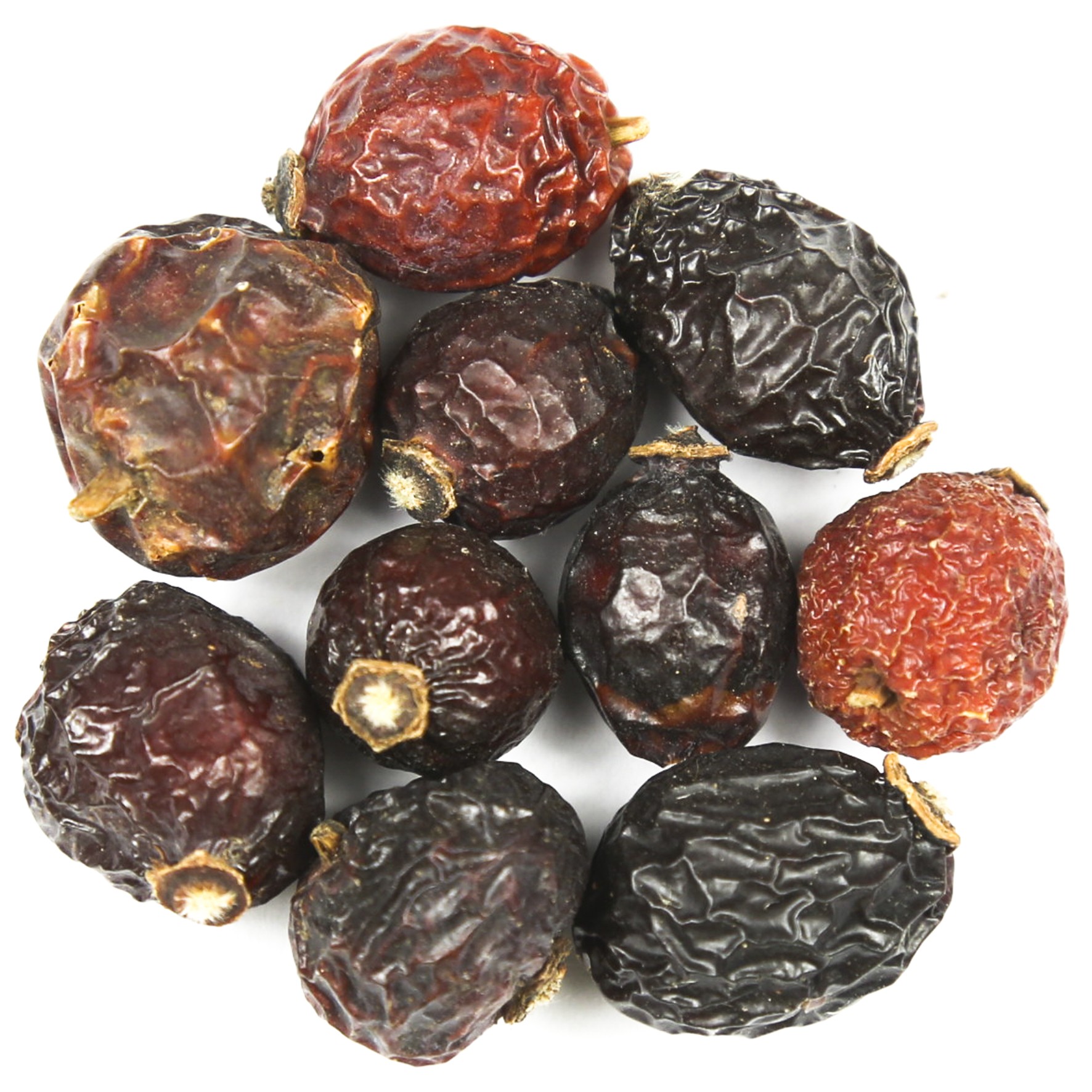Herbal Tea Brewing Guide

1 Teaspoon
Add 1 teaspoon per person and one for the pot.

95⁰c - 100⁰c
Boil using fresh water, at a temperature of 95⁰ - 100⁰c.

8 - 10 Mins
Steep for 8-10 minutes, depending on personal preference.
About Product
-
Product Description
These seemingly unassuming red fruit berries are, in truth, some of nature’s most wonderful little gems, especially when infused to make a mouthwatering herbal tea. While typically, it is the flower of the Rosa genus or, ‘rose plant’ which is most sought-after for its sheer beauty and natural fragrance, the fruit it bears known as a ‘rosehip’ or sometimes a ‘haw’ is often used for its health-promoting properties.
This is not all that rosehip tea can offer, for its flavour upon brewing is as equally enticing as its incredible potential to improve your everyday way of life. Rich in vitamins and minerals, Rosehip Tea (Whole) boasts distinctively tangy, and somewhat sour flavours, reminiscent of cranberries or pomegranates. This unique, tart taste is a true sensation in a cup.
Roses have been cultivated for thousands of years worldwide for a variety of reasons. Aside from the renowned flowers and their immense popularity in gardens and bouquets, the fruits known as rosehips have been included in many culinary dishes, including jellies, jams, syrups, marmalades, breads, pies, and salads. In the New World, in particular, roses flourish across the landscape, the indigenous populations have harvested rosehips for their powerful medicinal properties.This is similar to their consumption in much of Europe and Asia. Rosehips and Rosehip Tea was an integral part of Traditional Chinese Medicine (TCM), where they were used to treat kidney and urinary issues. They were likewise used as part of the ancient practice of Indian Ayurvedic Medicine, where rosehips were made into a tonic to improve what modern science knows as cognitive function. During the Second World War, when German blockades halted large quantities of vital supplies to the British Isles, many citrus fruits and supplements were in limited stock.
Rosehips, known to contain high levels of Vitamin C were used as a substitute during rationing, and were often made into syrups for citizens and servicemen alike. Consuming rosehip syrups or naturally tea, prevented scurvy, a deficiency disease caused by the lack of Vitamin C. To say rosehip ‘helped to win the war’ would, without a doubt, be an overstatement. However, to say it provided the nation with a much-needed boost both in vitamins and in overall morale would certainly be an accurate depiction of this wonder berry.
About Rosehip Tea Whole
Type of Tea: Herbal Tea.
Brewing Instructions: Rosehip Tea (Whole) may take longer to brew than some other herbal teas. The Kent and Sussex Tea and Coffee Company recommend brewing with freshly boiled water and infusing for 10 to 15 minutes.
How to Serve: This beverage is best served as it is.
Tasting Notes: Subtler in flavour compared with our Rosehip Tea, this particular herbal tea consists of a delightful earthy-floral infusion, combined with fruity undertones. Perfect for easy afternoon-drinking!
Colour in Cup: Pale peach liquor, light in tone.
Health Benefits of Rosehip Tea (Whole) – Notably nutritious brew! It contains a wealth of vitamins, minerals, and antioxidants, including Vitamins A, B-Complex, D, E, K, and P, as well as Calcium, Carotenoids, Cobalt, Copper, Flavonoids, Iron, Magnesium, Malic, Potassium, and Zinc. This is just to name a few! Choosing to include Rosehip Tea in your diet may aid in boosting the immune system. This, in turn, can provide you with protection against minor illnesses such as the common cold and flu. If, however, you have been unlucky enough to already get sick, Rosehip Tea (Whole) is the perfect remedy to clean the respiratory tract and clear mucus congestion. -
Delivery Information
We offer reliable delivery services through Royal Mail to ensure that your orders reach you on time.
Here are the main points you should be aware of:
- Standard UK Delivery: £3.95 excluding delivery charge.
- Delivery Times: Orders are processed and dispatched within 2-5 working days but they may take longer during busy times. It is worth noting that all our orders are packed by hand in order to maintain the quality.
- Free Delivery: We are delighted to provide free shipping for UK orders over £35*. Moreover, customers from Europe can enjoy free shipping for any purchase above €75*. Furthermore, we offer free delivery in the USA for all purchases exceeding $125*. Please note terms and conditions may apply.
- Tracking: When your package is sent you will receive a tracking number via email so as to keep tabs of its progress.
International Shipping
We do ship worldwide meaning our products can be accessed by anyone around the world.
Here are some important details:
- Delivery Times: International deliveries vary based on destination, generally taking between 7-14 working days.
- Shipping Costs: International shipping costs are calculated at checkout based on your location and weight of your order. View full delivery charges for your location.
- Customs and Import Duties: Remember customs or import duties may exist depending on regulations in your country; these charges are borne by the customer.
Returns Policy
Your satisfaction is our top priority, however if for any reasons you’re not completely happy with your purchase, simply follow our returns procedure:
- Eligibility: Items returned within 30 days of receipt must remain unopened and in their original condition.
- Process: In order to return an item contact our customer service department using your unique order number after which detailed instructions will be given concerning returning them back to us securely.
- Refunds: Our aim is to refund you within 5-7 working days upon successful reception of returned goods. The refund amount will be credited to your original payment method.
For any other Enquiries or help please contact our Customer Support Team always at your service.
-
Product Reviews

 Loose Leaf Tea
Loose Leaf Tea Pyramids
Pyramids Tea Bags
Tea Bags Africa
Africa Assam
Assam Ceylon
Ceylon Chinese
Chinese Darjeeling
Darjeeling European
European Indian
Indian Japan
Japan Nepal
Nepal South East Asia
South East Asia Ayurveda Tea
Ayurveda Tea Black Tea
Black Tea Chai Tea
Chai Tea Flowering Tea
Flowering Tea Fruit Tisanes
Fruit Tisanes Green Tea
Green Tea Herbal Tea
Herbal Tea Matcha Tea
Matcha Tea Oolong Tea
Oolong Tea Organic Tea
Organic Tea Pu erh Tea
Pu erh Tea Rooibos Tea
Rooibos Tea White Tea
White Tea Asian Coffee
Asian Coffee Caribbean Coffee
Caribbean Coffee Central American Coffee
Central American Coffee South American Coffee
South American Coffee Coffee Blends
Coffee Blends Decaffeinated Coffee
Decaffeinated Coffee Espresso Coffee
Espresso Coffee Ethically Sourced Coffee
Ethically Sourced Coffee Flavoured Coffee
Flavoured Coffee Organic Coffee
Organic Coffee Single Origin Coffee
Single Origin Coffee Chocolate 1
Chocolate 1 Chocolate 2
Chocolate 2 Chocolate 3
Chocolate 3 Chocolate 4
Chocolate 4 Chocolate 5
Chocolate 5 Chocolate 6
Chocolate 6 Chocolate 7
Chocolate 7 Chocolate 8
Chocolate 8 Chocolate 9
Chocolate 9 Loose Tea Filters
Loose Tea Filters Tea Accessories
Tea Accessories Tea Bricks
Tea Bricks Tea Caddies
Tea Caddies Tea Caddy Spoons
Tea Caddy Spoons Tea Gift Ideas
Tea Gift Ideas Tea Infusers
Tea Infusers Tea Strainers
Tea Strainers


